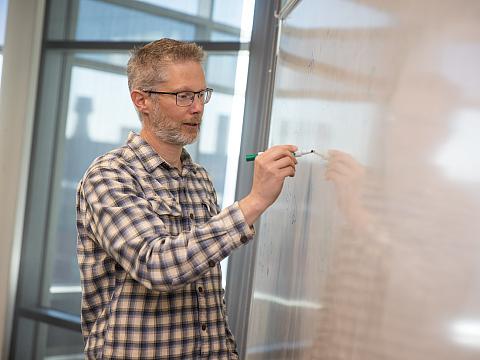
Random Allelic Expression of Genes Could Complicate Disease, Diagnosis
Do tissues in the body express mom’s genes or dad’s? A new study shows that sometimes it’s random, which could have implications for aging and diagnosis and treatment of certain diseases.
Random allelic expression (RAE) is a unique mode of gene regulation that has the effect of creating a patchwork of cells that randomly roll the “genetic dice” by expressing either maternal or paternal alleles. This is important because different alleles often have different genetic sequences. If, for instance, RAE results in preferential expression of a maternal allele that carries a mutation, that could greatly affect how the gene functions—and ultimately impact human health.
Since cells with or without RAE activate the same genes, these differences may not be readily apparent by looking at genetic sequence alone. This is a challenge for medicine because it means that genome sequence cannot accurately predict how mutations will affect an individual without better understanding how those mutations are expressed in the body.
A study published in Cell Reports involved analysis of more than 15,000 RNA-Seq datasets using new algorithms to uncover the landscape of allelic expression. Led by University of Utah Health graduate student Stephanie Kravitz with senior authors Aaron Quinlan, PhD, professor of human genetics, and Christopher Gregg, PhD, associate professor of neurobiology, the scientists introduced a methodology to profile random allelic expression and allele co-expression in 54 human tissues from 832 individuals. They found that RAE impacts rapidly evolving genomic regions and age-related disease mechanisms.
Their analysis shows that RAE is more common than previously thought and demonstrates that:
- RAE impacts genes significantly associated with adaptive cellular responses, such as homeostasis, cellular signaling, inflammatory and immune responses, and apoptosis. In contrast, biallelic genes are linked to essential nuclear functions such as regulating the cell cycle, DNA replication and repair, and gene regulation.
- RAE genes are significantly associated with age-related diseases such as diverse cancers, neurodegenerative diseases, and cardiovascular diseases.
- RAE genes show enriched roles in human genome evolution and phenotypic variation.
The results show links between RAE and phenotypic variability, cancer, neurodegeneration, and other age-related diseases. These insights reveal new complexities that will be important to better understand these diseases and their diagnoses and treatments.
# # #
In addition to Kravitz, Quinlan, and Gregg, study co-authors are Elliott Ferris, PhD, Michael Love, PhD, and Alun Thomas, PhD. The research published as “Random Allelic Expression in the Adult Human Body.”
